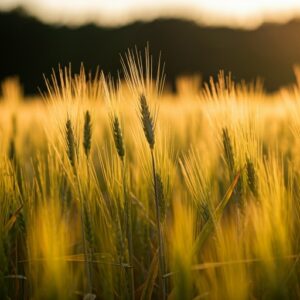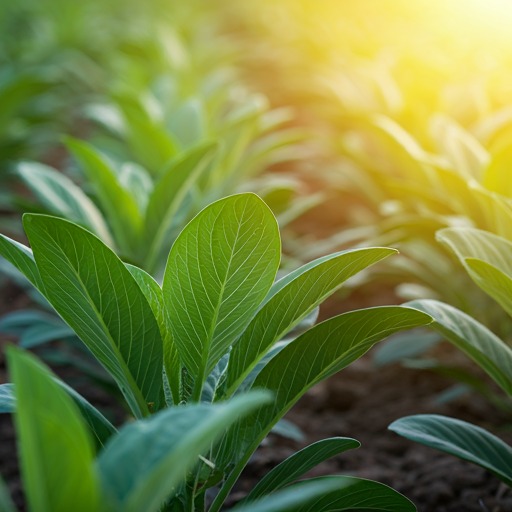In the world of sustainable farming, crop choice plays a pivotal role in balancing profitability with ecological impact. At Utopiaa, our approach to managed farmland is rooted in carefully selected, diverse crop cultivation, spanning everything from high-value timber to exotic herbs. This diversity doesn’t just generate varied income streams for investors—it creates a resilient agricultural ecosystem that protects the land, conserves resources, and ensures long-term ecological stability.
In this blog, we’ll explore how Utopiaa’s innovative crop choices across different projects maximise returns, mitigate risk, and support environmental health.

Crop diversity is essential in sustainable farming for a few key reasons: it reduces reliance on a single crop, mitigates risks associated with market and climate fluctuations, and fosters healthier soils. In conventional farming, monoculture (the practice of growing a single crop over a large area) can lead to soil depletion and increased vulnerability to pests and diseases. By contrast, Utopiaa’s farms are designed to integrate multiple crop varieties that thrive in symbiosis, each chosen for its economic potential and low environmental impact.
On a Utopiaa farm, each crop type serves a specific function within the broader ecosystem. For example, nitrogen-fixing crops replenish the soil, timber provides long-term capital gains, and high-value spices contribute consistent income. This approach not only strengthens the soil but also creates a diverse habitat that supports local flora and fauna, fostering a balanced, productive environment.
Across our projects, Utopiaa’s crop selection includes a mix of timber, spices, herbs, and more. Here’s a closer look at some of the key choices and how they contribute to both investor returns and ecological health:
As consumer demand shifts toward healthier, natural foods, exotic fruits like avocado, lemon, and dragon fruit have seen a rapid rise in popularity. We integrate these high-value fruits into several of our projects, providing investors with access to trending, profitable produce. These fruits do more than boost profitability; they enrich the land, support sustainable farming practices, and reduce dependency on traditional crops.
Our diverse crop strategy isn’t just about short-term gains—it’s a deliberate approach to building resilience and maximising returns over the long run. By planting a variety of crops with different harvest cycles and market demands, we reduce dependency on a single crop’s market performance. This income diversification safeguards investors from fluctuations that might affect specific agricultural products, ensuring that profitability remains steady regardless of external economic shifts.
Moreover, the inclusion of both annual and perennial crops allows us to achieve a stable balance between short-term income and long-term capital gains. For example, pepper and cardamom provide annual harvests, creating regular income, while sandalwood and timber trees appreciate in value over years. This model offers both financial stability and ecological health, creating an investment asset that grows in value and contributes to a greener, more sustainable world.
What makes Utopiaa’s managed farmland truly unique is its commitment to ecological sustainability. Our carefully designed projects integrate eco-friendly practices that rejuvenate the soil, conserve water, and reduce reliance on synthetic chemicals. Each farm operates as a balanced ecosystem, where agroforestry, organic crop management, and sustainable water practices work together to protect the land and its natural resources. By promoting practices like intercropping, soil regeneration, and the use of native trees, we not only sustain but actively improve the health of the land. This results in a farm that is as productive and profitable as it is environmentally responsible.

For the eco-conscious investor, we offer a unique opportunity to support meaningful change through farmland investment. Our projects help combat deforestation, promote biodiversity, and contribute to carbon sequestration, which are essential steps toward mitigating climate change. By planting trees like teak, sandalwood, and other native species, we offset carbon emissions and plays an active role in reforestation, offering a tangible way for investors to positively impact the planet.
Additionally, our crop diversity approach minimises ecological risks and enhances farm resilience. By nurturing a variety of crops within a single farm, we reduce the risk of soil depletion, erosion, and pest outbreaks, issues that often plague conventional farming. This multifaceted ecosystem not only protects the farm from environmental stresses but also fosters a vibrant, biodiverse landscape that supports local wildlife and pollinators, creating a farm that is both self-sustaining and harmonious with nature.
Our model represents a new standard for what farmland investment can achieve. Our approach shows that profitability and environmental stewardship are not mutually exclusive; in fact, they are deeply interconnected. Each crop choice is a careful decision that considers both financial gain and ecological impact, ensuring that Utopiaa’s managed farms are assets that will thrive for decades to come. By aligning economic interests with sustainable practices, we’re redefining what it means to invest in farmland—transforming it into a path toward long-term ecological balance and responsible land management.
Our commitment to cultivating a wide range of sustainable crops goes beyond profit—it’s a model for creating lasting value, both financially and ecologically. In every project, we prioritize crops that align with sustainable farming practices, support local ecosystems, and diversify income streams, creating an asset that grows in value over time. Our approach ensures that each investment in farmland is not just a financial decision but a step toward a greener, healthier world.
By choosing diverse crop selections—from valuable timber and traditional spices to high-demand exotic fruits—Utopiaa strategically balances immediate returns with long-term growth. Our farms produce consistent income through annual harvests of crops like pepper, cardamom, and lemon, while high-value timber and sandalwood trees appreciate steadily, promising significant returns in the years ahead. This diversity safeguards our investors against market volatility, with a resilient portfolio that can adapt to changes in consumer demand, climate conditions, and economic factors.
As a Utopiaa investor, you’re not simply purchasing a plot of land; you’re investing in a legacy. You’re part of a community dedicated to cultivating a sustainable future, where agriculture supports the planet rather than depleting it. Through Utopiaa’s managed farmland projects, you gain the benefits of financial returns while contributing to environmental sustainability, reforestation, and the well-being of future generations. Utopiaa is proud to offer a pathway to profitable, eco-friendly investment, turning each farm into a lasting testament to the power of responsible land stewardship.
If you’re looking to invest in farmland that combines financial gains with eco-conscious farming practices, Our diverse projects offer an ideal blend of income streams and ecological stability. From high-value timber and spices to innovative agroforestry, our managed farmlands provide a sustainable path to long-term growth.
Visit Utopiaa to explore our diverse farmland projects or contact us to learn more about how you can invest in an eco-friendly future with profitable returns.